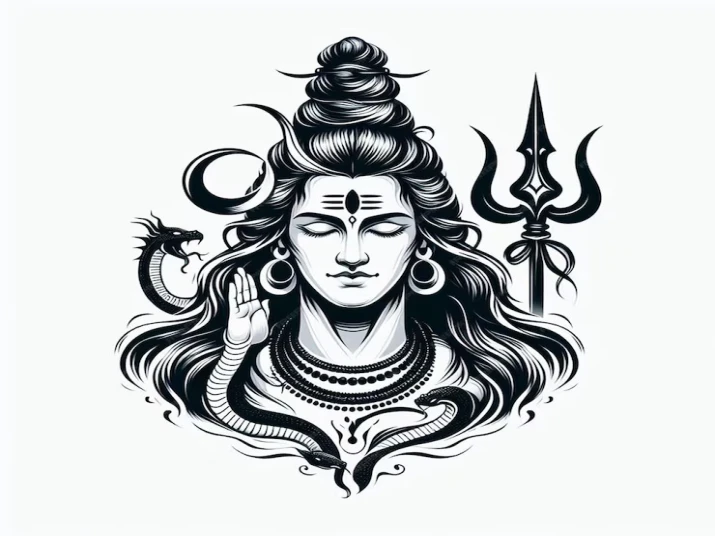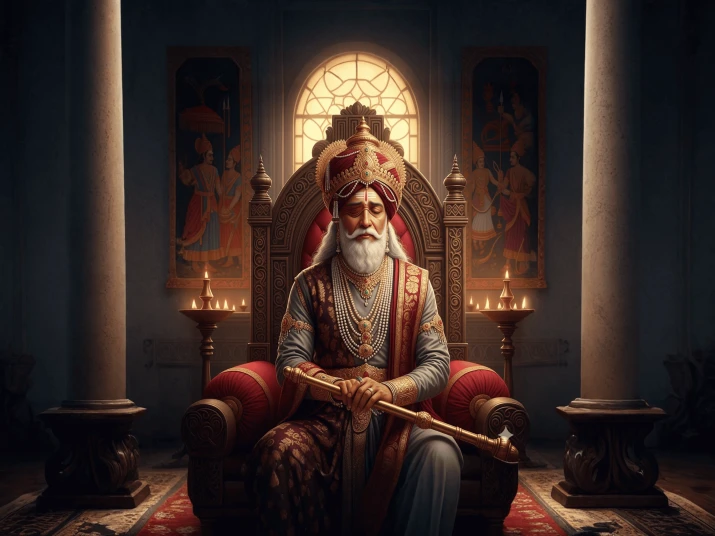Why was King Dhritarashtra of Hastinapur born blind?


Table of Contents
Why was King Dhritarashtra of Hastinapur born blind?
Dhrudrashtra, one of the central characters of the Mahabharata, the king of Hastinapur and the father of, was a born blind person. Dhritarashtra's blindness is not just a physical limitation, but it is much more deeply symbolic. Bears meaning. In the description of Mahabharata, Dhutrashtra is shown as a ruler who is not only physically Not only was he blind, but he was also morally and mentally blind. This moral blindness of his was the main reason for the war in the Mahabharata.
We know that according to the description of the Mahabharata, Dhritarashtra was born blind. Dhrudrashtra was the king of the Kuṇḍarb clan, and he was at the time of the Kurukshetra war between the Pandavas and the Kuṇḍarbs. Was the ruler of Hastinapur.
If we examine Dhritarashtra's blindness in a symbolic sense, the situation becomes clearer. But many believe that Dhritarashtra's blindness was not only physical. He was blind in seeing and understanding many things from a moral and mental point of view. Because of his blind support and favoritism towards the wrongdoings and immorality of his children. The war of the Mahabharata started.
Blindness of Dhrudrashtra: A symbolic analysis of physical and moral blindness is presented below. Here are:
Physical Blindness
Dhritarashtra's physical blindness affected his entire life. He took charge of the governance of the state, but due to his blindness, he was unable to manage the actual governance. Always expressed weakness. What is most required of a ruler – নিয়পগ্রায়তা, moral wisdom, and consistency. The sense of judgment was absent in the state. His blindness was not limited to his physical eyes only, but also to his thoughts, conscience, and He also swallowed his sense of justice.
Moral lindness
Dhritarashtra's moral blindness is one of the most important issues of the Mahabharata. As a king, his biggest responsibility was to establish justice for his subjects. But he failed to do so. His children, especially Mishra, are constantly involved in wrongdoing and unethical decisions. They were educated, but Dhritarashtra never tried to bring them onto the right path. His own weakness and blind support for his children gradually created chaos in the kingdom. Did it.
Dhudhastra knew well that the conduct of mischief and fraudsters was justified, and Immorality is harming the state. Still, he considered himself weak and was afraid to take any strong action. On the one hand, his silence towards the Pandavas and his sense of justice, on the other hand, his partiality towards the Kauravas, is A prime example of the moral blindness of Dhrudhastra.
Bias and blind support
Dhritarashtra's biggest weakness was his blindness towards his children. Samirthan. Duryodhana, his first son, harbored violence and hatred towards the Pandavas, making him very immoral. Was the source of karma. Unfair behavior of Duryodhan, insulting, usurping the kingdom and property of the Pandavas. Wanted - not to provide any hindrance to Dhritarashtra in this activity and to continuously support it. Very important.
Dhritarashtra got the opportunity several times to move away from this trend of favoritism for the welfare of the kingdom. And to work towards establishing justice. But he failed to fulfill that responsibility, as a result of which there was conflict between the Kauravas and the Pandavas. Take final form, and the battlefield begins.
Symbolic analysis
Dhritarashtra's blindness is symbolically understood as mental and moral blindness. As a symbol. In the philosophy of the Mahabharata, Dhrudrashtra is not only a physically blind person, but he is also a ruler who was unable to differentiate between truth and lie, justice and injustice, right and wrong.
His moral blindness is a symbol of his inability to establish justice in society. The first and foremost responsibility of a ruler is to ensure justice. Due to Dhritarashtra's failure to follow that path, chaos was created in his kingdom. Dhrudrashtra's blind support, weakness, and favoritism towards his own family made him the leader of the Mahabharata. Made him the most important and tragic character.
Was Dhritarashtra a failed king?
The duty of a king is to ensure the safety, welfare, and justice of his kingdom and subjects. To do. In ancient Indian philosophy, kingship was seen as a very important and great responsibility. Establishing policy and justice for a king and conducting governance in the right and equitable way. It is essential to use it. Some important points about the king's religion are discussed below:
1. Establishment of justice
The main responsibility of Rajdharma is to establish justice. A king or ruler must treat his subjects equally and, based on justice, will have to rule. One should not show favoritism under any circumstances. Fairness and impartiality are important for proper governance.
2. Protection of citizens
The king is responsible for the safety of his subjects. He will protect his kingdom from external enemies, attacks, and internal chaos. To maintain the peace and stability of the kingdom, the king has to be strong and courageous.
3. Follow the path of policy
It is very important to follow the path of policy or religion in Rajdharma. A king should look out for the welfare of his kingdom and people rather than his own personal desires or feelings. Taking the right and ethical decisions. The king's behavior and governance should be based on morality.
4. Economic growth and social welfare
The king is responsible for the economic development and social welfare of his kingdom. Responsible. During his rule, attention will be given to the development of agriculture, trade, education, and industry. To improve the quality of life of the citizens by maintaining the wealth and economic stability of the state. King's responsibility.
5. Maintaining peace and stability
The king has an important role in maintaining peace and stability in Rajdharma. The king has to work to prevent social chaos, inequality, and riots. He will be prudent and patient in establishing peace in the society.
6. Participation in charity and public service
In Rajdharma, the king's public service and charity are also seen as a great responsibility. Helping the poor or helpless among the subjects and working for their welfare is one of the king's responsibilities.
7. Taking advice
The religion of a good king is to take advice from wise and experienced advisors. Taking advice from wise people and making decisions with sound judgment, rather than deciding everything himself, is the sign of a just king.
8. Self-control
The king or ruler should keep his own emotions and desires under control. The religion of a king is not to take any decision out of anger, greed or jealousy. He should always conduct his rule in the light of scriptures, principles, and religion.
Conclusion:
Dhritarashtra's blindness is not only a lack of physical sight, but also a symbol of his moral and mental weakness. As a king, his duty was to establish justice and make the right decisions, but he failed in that duty. His blindness was not limited to his eyes only, but also to his thoughts, conscience, and morality. This moral blindness of Dhritarashtra became one of the reasons for the Kurukshetra War of the Mahabharata.
A big lesson can be learned from Dhritarashtra's life—deviating from the path of morality and justice as a ruler or leader can bring disaster not only for himself but also for the entire society.
The religion of a king is not only to hold power or rule, but also to ensure the justice, protection, and welfare of his subjects. Following the path of principles, establishing justice, and acting with kindness and goodwill towards his subjects is the religion of a true king.
For Add Review. You Need To Login First Login Page

Comments
No comments yet